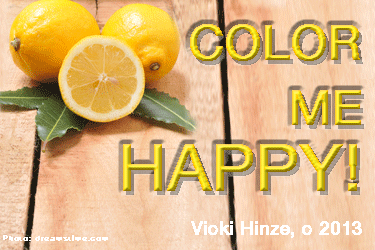
Photo Credit: dreamstime.com
Color Me Happy—Again and Again and Again
By
Vicki Hinze
Inspiration can come at you from any direction, at any time, and in any form. The thing isn’t whether or it will come, it’s whether or not we’ll notice it when it comes. And beyond that, if we’ll notice that it comes again and again—and then again. Let me explain…
In 1994 or so, I wrote a trilogy of books set at Seascape Inn, a bed and breakfast in Maine. St. Martin’s Press published them, and they did well. That was that—or so I thought. What I couldn’t have known then is these books would be back.
Almost two years ago, I licensed the books a second time, to Bell Bridge Books. They reissued them with spiffy new covers (and disclosed to my readers the original publications so there’d be no confusion.) Then Bell licensed large print and audio and then asked if I’d be willing to do a “clean reads” version of the books for another license. I did, so now there’s a general market version, audio, electronic, trade print, and a clean read version in electronic and hard cover.
Who could have expected all this on three books I wrote nearly two decades ago?
Now a little history. When I wrote the books, they were part of the first known open-ended continuity series of single title novels. I co-created this series and received a career achievement award for this new trail, which was a perk—I love doing what hasn’t been done, trying to make something new work! Anyway, my point isn’t how it resulted, but that it was new and different and risky. So much so that my then agent didn’t want to submit the books to publishers. I said fine and did it myself. I submitted to five publishers and four were interested. I went to New York and discussed the project with them and went with St. Martin’s. The editor was excited about the project, bouncing in her chair. So while she didn’t offer the most money, she clearly had captured the vision and bubbled enthusiasm. That most mattered, especially because this was new and risky. Oh, I fired the non-visionary agent, too. (If she opposed risks, it wasn’t a good match, though she’s a good agent. Just not right for me.) So everything worked out well for everyone.
Fast forward to 2011 and the new licenses to Bell. I’m going to include an article I wrote at the time because it speaks to mindset, but also to your writing never being done and over and finished. Writers need to know that, and to understand that it isn’t a matter of repurposing books, though that can be done too, it’s that stories written with purpose, based on universal principles, can find homes in human hearts indefinitely. That’s the message I want to share today in this article.
Here’s the original article—Color Me Happy!
I heard on the news this morning that a study’s been done and if you’re an optimist it’s because the frontal lobe in your brain is malfunctioning. Have you ever heard such utter nonsense?
Look, life’s tough. Nobody reaches puberty much less adulthood without enduring a broken heart, emotions that run the breadth of the stratosphere, and a couple head-on collisions with brick walls. That’s called life and growing up. Not brain malfunction.
Optimism is a choice. The day is coming anyway. It’s going to unfold anyway. Now it can unfold with me having a good attitude, making the most I can make of the day, or it can unfold with me having a bad attitude, wasting the chance to make anything good of the day because I’m tied up griping about it, being depressed about it, or being snagged and tossed into the pit of despair. Regardless, the day will unfold.
The griping, depressed, pit of despair doesn’t sound at all appealing so I’m not going there. Period. I choose to use my functioning-fine brain and see the glass as half full. It’s a choice. A choice I make. That’s fair, since I live it.

Photo Credit: dreamstime.com
I didn’t just get this attitude; I’ve had it as long as I can remember. It’s probably a pretty good thing because life sure throws us a lot of opportunities to make lemonade, now doesn’t it? I got lucky. I happen to love lemonade.
So I was having not a single glass but a pitcher full, and this truth about life settled in. It’s a choice.
I was contemplating my next writing project and deciding what path I wanted to take. I stood at a proverbial crossroads, so to speak. Anyway, that it’s a choice kept going through my mind. And then reaching for a fresh glass of lemonade, a thought struck me: What if you didn’t seem to have a choice?
Ooh, I didn’t much like that. It shot holes in my theory. Made leaky my façade that I at least had a little control of my life. No one likes those kinds of theories becoming sieves right before their eyes—and yet I couldn’t shove the thought away. What if I didn’t have a choice? Mmm, couldn’t fight it. I was intrigued.
So what happens? Say you are pretty banged up from life battles and you’re chugging lemonade by the barrel. Say you’ve looked at the problems and now you’re focusing on the solutions only there are none. You’ve been robbed. Your choice is MIA—and you’re stuck. I don’t mean figuratively. I mean literally. What do you do now?
That’s the situation that led to the Seascape novels. Led to the first one, Beyond the Misty Shore, specifically.
Being stuck doesn’t exactly inspire you to be in the most receptive frame of mind. Sunshine is arrogant when you’re grieving, right? But isn’t it true that the worst possible time is always when the most important things happen?
It has been in my life, and it is in T.J.’s too. He’s the guy stuck in Beyond the Misty Shore. Toss in a woman who loves to hate him, and the wise Seascape innkeeper (who seems to know everything but won’t just tell anyone anything because “some things are best learned firsthand”), a colorful cast and Maine cliffs and a little otherworldly intervention, and, well, T.J. has his work cut out for him, doesn’t he?
Don’t feel too bad for him. We’ve all been there. And, you know, sometimes when we’re broken, we have to really hurt to ever get beyond the pain. We have to figure out that we can heal before we do heal. Eventually, we get it. And when we do, magic happens. We no longer just survive. We truly live.
Gee, I’m misting up here. I think I’ll pack a bag and go visit Seascape Inn again . . . just as soon as I finish this glass of lemonade.
So okay, that’s the original article and how inspiration for a series came: news article, a truth about life revealed (we choose our reactions), and noticing inspiration had arrived and its purpose.
The book, I’d thought, had served its purpose. I was wrong. I discovered it on this series, in the new opportunities that kept arising. And I also became aware of a few opportunities I missed.
So the overall point? Color yourself happy, notice inspiration, and just because you think you’re done, that doesn’t mean you’re done, so continue to notice and act on sparks of inspiration. Remember, inspiration can come to you in any form, at any time, from anywhere. Knowing all that potential is there should color us all happy!
* * * * * * * * * * *


Vicki Hinze
Vicki Hinze is the award-winning bestselling author of nearly thirty novels in a variety of genres including, suspense, mystery, thriller, and romantic or faith-affirming thrillers. Some releases are: Beyond the Misty Shore (romantic suspense), Duplicity (mystery/thriller), One Way to Write a Novel (nonfiction). She holds a MFA in Creative Writing and a Ph.D. in Philosophy, Theocentric Business and Ethics. Hinze’s website: www.vickihinze.com. . Books. . Contact.


